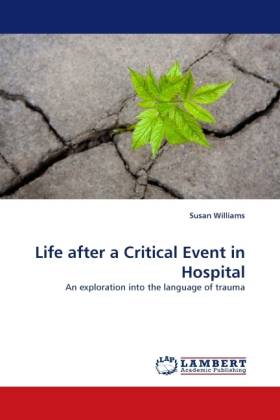
- Afhalen na 1 uur in een winkel met voorraad
- Gratis thuislevering in België vanaf € 30
- Ruim aanbod met 7 miljoen producten
- Afhalen na 1 uur in een winkel met voorraad
- Gratis thuislevering in België vanaf € 30
- Ruim aanbod met 7 miljoen producten
Zoeken
Life after a Critical Event in Hospital
An exploration into the language of trauma
Susan Williams
Paperback | Engels
€ 77,95
+ 155 punten
Omschrijving
Patients who endured an unanticipated life threat after admission to hospital were selected from intensive care admission summaries. Unstructured interviews one month and one year after discharge sought to explore their linguistic representations of those critical incidents. Transcripts were colour differentiated into discourse rich, narrative rich, or phenomenologically rich language. Three qualitative methodologies were blended to provide multiple lenses for analysis, e.g. discourse analysis highlighted local influences on participant speech, while narrative analysis illuminated larger units of talk and the extent of story development in relation to various dimensions of coherence. These analytical tools engendered understandings which facilitated a phenomenological rendering of experience. Although participants had unique experiences, significant life disruption was evident in both the content and structure of narratives. A correlation between the resolution of that disruption and the level of narrative construction was suggested by the data. Future studies could test the usefulness of narrative development theories for psychological recovery after intensive care.
Specificaties
Betrokkenen
- Auteur(s):
- Uitgeverij:
Inhoud
- Aantal bladzijden:
- 424
- Taal:
- Engels
Eigenschappen
- Productcode (EAN):
- 9783838335988
- Verschijningsdatum:
- 22/03/2010
- Uitvoering:
- Paperback
- Afmetingen:
- 152 mm x 229 mm
- Gewicht:
- 617 g

Alleen bij Standaard Boekhandel
+ 155 punten op je klantenkaart van Standaard Boekhandel
Beoordelingen
We publiceren alleen reviews die voldoen aan de voorwaarden voor reviews. Bekijk onze voorwaarden voor reviews.











